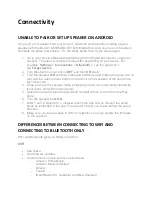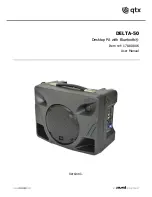
FCC Class B Radio Interference Statement
NOTE: This equipment has been tested and found to comply with the limits for a Class
B digital device, pursuant to Part 15 of the FCC Rules. These limits are designed to
provide reasonable protection against harmful interference in a residential installation.
This equipment generates, uses and can radiate radio frequency energy, and if not
installed and used in accordance with the instructions, may cause harmful interference
to radio communications. However, there is no guarantee that interference will not
occur in a particular installation. If this equipment does cause harmful interference to
radio or television reception, which can be determined by turning the equipment off
and on, the user is encouraged to try to correct the interference by one or more of the
following measures:
1. Reorient or relocate the receiving antenna.
2. Increase the separation between the equipment and receiver.
3. Connect the equipment into an outlet on a circuit different from that to which the
receiver is connected.
4. Consult the dealer or an experienced radio/TV technician for help.
This device complies with Part 15 of the FCC Rules. Operation is subject to the
following two conditions: (1) this device may not cause harmful interference, and (2)
this device must accept any interference received, including interference that may
cause undesired operation.
Notice:
1. The changes or modifications not expressly approved by the party responsible for
compliance could void the user’s authority to operate the equipment.
2. Shielded interface cables and AC power cord, if any, must be used in order to
comply with the emission limits.
3. The manufacturer is not responsible for any radio or TV interference caused by
LEGAL & COMPLIANCE
unauthorized modification to this equipment. It is the responsibilities of the user to
correct such interference.
RF Exposure Information
This device meets the government’s requirements for exposure to radio waves. This
device is designed and manufactured not to exceed the emission limits for exposure
to radio frequency (RF) energy set by the Federal Communications Commission of the
U.S. Government. This device complies with FCC radiation exposure limits set forth for
an uncontrolled environment.
IC Statement
Operation is subject to the following two conditions:
1. This device may not cause interference, and
2. This device must accept any interference, including interference that may cause
undesired operation of the device.
This Class B digital apparatus complies with Canadian ICES-003.
Cet appareil numérique de la classe B est conforme à la norme NMB-003 du Canada.
IC Radiation Exposure Statement
This equipment complies with IC RSS-102 radiation exposure limits set forth for an
uncontrolled environment. This equipment should be installed and operated with
minimum distance 20cm between the radiator & your body.
Disposal and Recycling
You must dispose of this product properly, according to local laws and regulations.
Because this product contains electronic components and a battery, it must be
disposed of separately from household waste. Contact local authorities to learn
about disposal and recycling options.
INFORMATION ON HEARING DAMAGE
Understanding Noise Induced Hearing Loss
Exposure to loud sounds can damage your hearing, causing hearing loss and tinnitus
(ringing or buzzing in the ears). While a variety of things can lead to hearing loss,
including aging and side effects of certain medications, the most common cause of
non-age-related hearing damage is loud noise. Extremely loud sounds, such as gun
shots or firecrackers at close range, can cause immediate hearing damage. Hearing
damage can also occur over time due to repeated exposure to loud sounds such as
industrial noise or loud music. With continued exposure to loud noises, ears may
become accustomed to the sound level, which may result in permanent damage to
hearing without any noticeable discomfort.
Temporary and Permanent Hearing Loss
Noise induced hearing loss and tinnitus may be temporary or permanent. Ears
typically recover from temporary hearing damage in a short time. However, ears may
not recover completely, and some damage may be permanent. Repeated exposure
to loud sound can cause more and more damage, and eventually lead to serious
hearing problems. Scientists generally agree that, over time, exposure to harmful
levels of noise can lead to permanent noise induced hearing loss by damaging and/
or destroying the inner ear’s sensory hair cells.
Loud Time = Hearing Loss
The more time you spend exposed to loud sounds, the more likely you are to damage
your hearing. All of the loud sounds that you are exposed to during a day add up -
continued exposure to loud sounds can prevent your ears from recovering and also
cause additional damage.
Symptoms of Hearing Loss
While not all noise induced hearing loss is noticeable, symptoms may include
a sensation of pressure or fullness in your ears, ringing in your ears, or muffled
speech. If you experience these symptoms or believe you may have experienced
noise induced hearing loss, you should have your hearing checked by an ear doctor
or audiologist.
CARE & MAINTENANCE
Do not use volatile solvents (such as toluene, rosin, or alcohol) to clean this product.
Such chemicals may damage it. Do not spray cleaners directly on the product. To
clean this product, gently wipe it with a clean, dry, soft cloth.
21


































